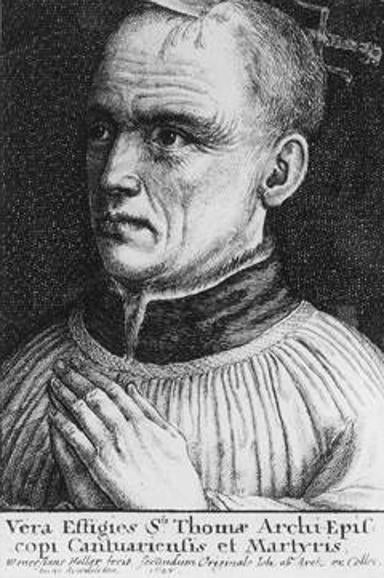29 December 1170: The death of Thomas Becket, the 'turbulent priest'
After his death, people began venerating Thomas Becket as a martyr and he was canonised by Pope Alexander III in 1173
MINDY BURROWS
Viernes, 29 de diciembre 2017, 17:24
Saint Thomas of Canterbury is perhaps one of the best known martyrs of today, with a complex and tragic tale of religion, friendship, and betrayal leading to his canonisation and the celebration of this day, 29 December, as his Saint's Day.
Thomas Becket became Lord Chancellor in 1155, as then Archbishop of Canterbury Theobald of Bec, recommended him for the post to King Henry II after serving as Archdeacon of Canterbury for a year. As part of this role, Becket had to foster the King's son, Henry, for some time and the younger Henry was reported to have said that he was shown more fatherly love in one day from Thomas Becket than his father showed him for his entire life. His kindness was not unnoticed by others, being described as &ldquosweet and pleasant in conversation, amiable in his manners&rdquo by a monk of Canterbury who worked with Becket.
It was during Becket's time as Lord Chancellor that he and Henry II's friendship began. When Becket was made Archbishop of Canterbury on 23 May 1162, following the death of Theobald, the king hoped that their close, personal friendship would mean that the new archbishop continued to put the royal family first, ahead of the church. There was fierce opposition from within the clergy at this choice for the new Archbishop of Canterbury as Thomas Becket was not a monk. Nevertheless, the king was insistent and the members of the church reluctantly accepted.
However, giving his close friend and confidante a position of power within the church did not go as well for King Henry II as he had intended. After becoming archbishop, Becket renounced his former life of pleasures and became a serious, simply-dressed cleric. Within this great change, he stopped aiding the king and putting the royal's interests first and started championing ecclesiastical rights.
A rift grew between the former friends and Becket resigned his chancillorship. Henry II attempted to influence the other bishops against Becket in October 1163 when he sought approval of the traditional rights of the royal government in regard to the church. He received approval from every bishop except Becket.
In 1170, Becket excommunicated three bishops who crowned Henry the Young King, a job done by the archbishop. He then went on to excommunicate his opponents within the church. Upon hearing this, King Henry was furious and uttered his immortal words &ldquowill no one rid me of this turbulent priest&rdquo (although his exact words are subject to debate), and four knights set out to confront Becket. When he refused their demands to go to Winchester to meet the king, the knights assassinated him.
After his death, people began venerating Thomas Becket as a martyr and he was canonised by Pope Alexander III in 1173. In 1174, Henry made a pilgrimage to Thomas Becket's tomb and publicly wept and repented.
There are several churches and chapels dedicated to the 'turbulent priest' in Spain, including the Iglesia de Santo Tomás Cantuariense in Salamanca and the Vegas de Matute church in Segovia.
